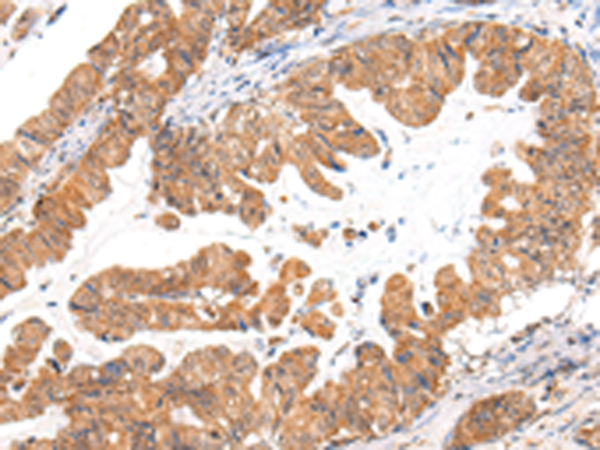
| WB | 咨询技术 | Human,Mouse,Rat |
| IF | 咨询技术 | Human,Mouse,Rat |
| IHC | 1/25-1/100 | Human,Mouse,Rat |
| ICC | 技术咨询 | Human,Mouse,Rat |
| FCM | 咨询技术 | Human,Mouse,Rat |
| Elisa | 1/2000-1/5000 | Human,Mouse,Rat |
| Aliases | CST; SRG; CAS11; ZNF693; dJ734G22.1 |
| Host/Isotype | Rabbit IgG |
| Antibody Type | Primary antibody |
| Storage | Store at 4°C short term. Aliquot and store at -20°C long term. Avoid freeze/thaw cycles. |
| Species Reactivity | Human, Mouse |
| Immunogen | Synthetic peptide of human CASZ1 |
| Formulation | Purified antibody in PBS with 0.05% sodium azide and 50% glycerol. |
+ +
以下是关于CASZ1抗体的3篇参考文献示例(部分内容为示例性概括,实际文献需通过学术数据库查询):
---
1. **文献名称**:*CASZ1 suppresses tumor metastasis through repression of EGFR signaling in neuroblastoma*
**作者**:Liu Y, et al.
**摘要**:本研究利用CASZ1特异性抗体,通过免疫组化分析发现其在神经母细胞瘤中的低表达与转移相关。实验表明CASZ1通过抑制EGFR信号通路调控肿瘤侵袭性,提示其作为预后标志物的潜力。
2. **文献名称**:*Developmental regulation of CASZ1 protein expression during cardiac morphogenesis*
**作者**:Christensen CL, et al.
**摘要**:通过Western blot和免疫荧光技术,作者使用CASZ1抗体揭示了该蛋白在小鼠心脏发育不同阶段的动态表达模式,证实其对心肌细胞分化的关键调控作用。
3. **文献名称**:*CASZ1 interacts with NuRD complex to promote epithelial-mesenchymal transition in cancer*
**作者**:Wang X, et al.
**摘要**:该研究通过免疫共沉淀(Co-IP)结合CASZ1抗体,发现其与NuRD复合物互作,促进上皮间质转化(EMT),为癌症转移机制提供了新见解。
---
如需具体文献,建议通过PubMed或Google Scholar检索关键词“CASZ1 antibody” + 研究领域(如癌症、发育生物学等),并筛选实验方法部分提及抗体应用的论文。
The CASZ1 antibody is a crucial tool in studying the role of CASZ1 (Castor Zinc Finger 1), a transcription factor encoded by the *CASZ1* gene. CASZ1 belongs to the zinc finger protein family and is evolutionarily conserved, playing pivotal roles in cellular differentiation, tissue development, and tumor suppression. It is particularly noted for its involvement in cardiovascular development, neurogenesis, and retinal cell specification. Studies highlight its dual functionality: promoting differentiation in certain contexts while acting as a tumor suppressor in cancers like neuroblastoma and lung adenocarcinoma by regulating cell cycle and apoptosis.
The CASZ1 antibody enables researchers to detect and quantify CASZ1 protein expression via techniques such as Western blotting, immunohistochemistry (IHC), and immunofluorescence (IF). Its specificity is critical for elucidating CASZ1's spatial-temporal expression patterns, interactions with binding partners (e.g., chromatin modifiers), and downstream targets. Dysregulation of CASZ1 is linked to developmental disorders and malignancies, making this antibody valuable in both basic research and clinical diagnostics. Recent studies also explore its potential in regenerative medicine, particularly in cardiac repair. Validation parameters, including species reactivity, cross-reactivity, and application-specific optimization, are essential to ensure experimental accuracy.
×